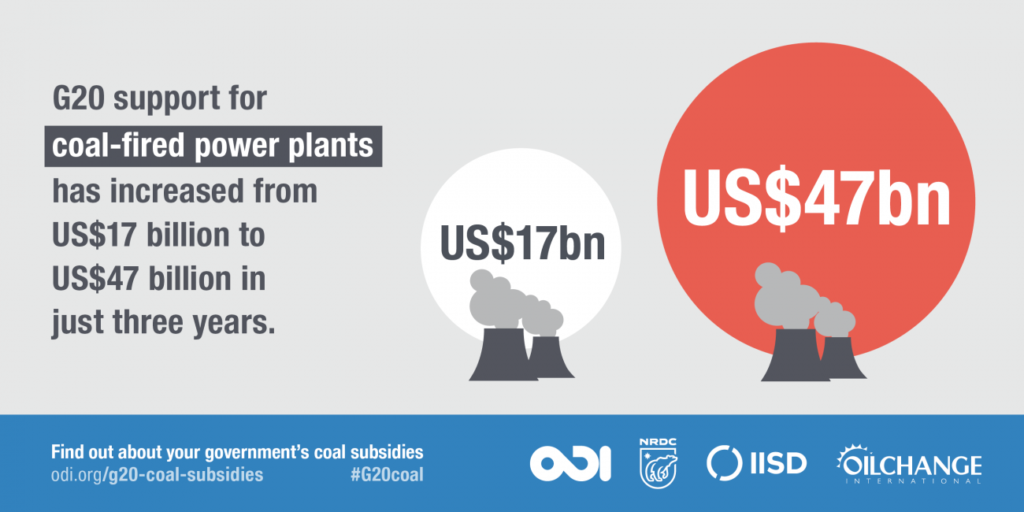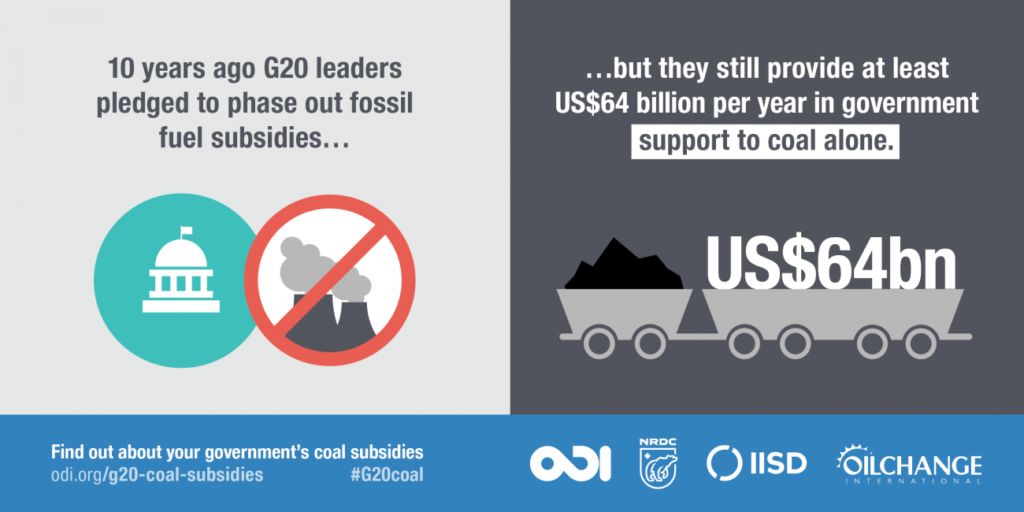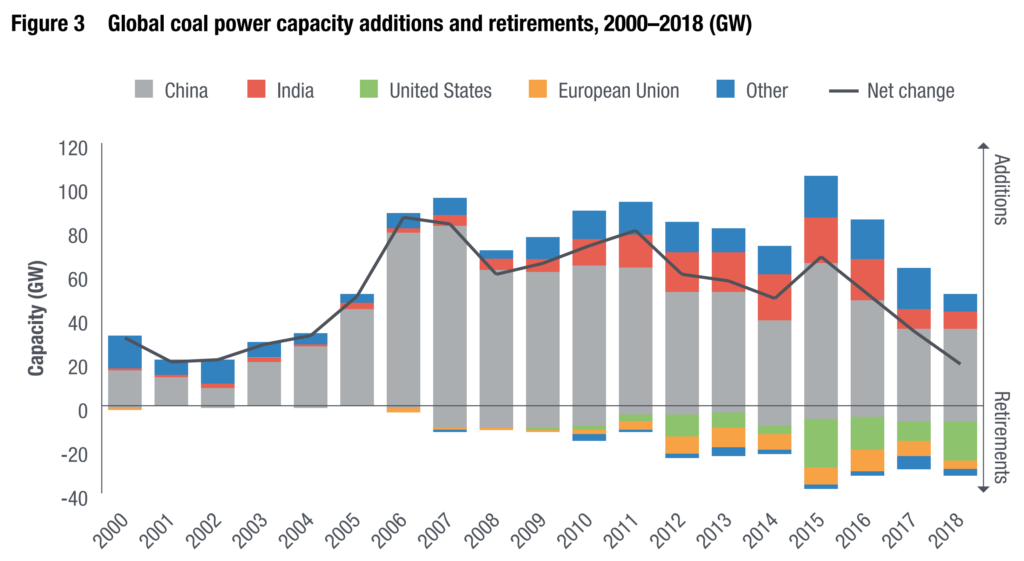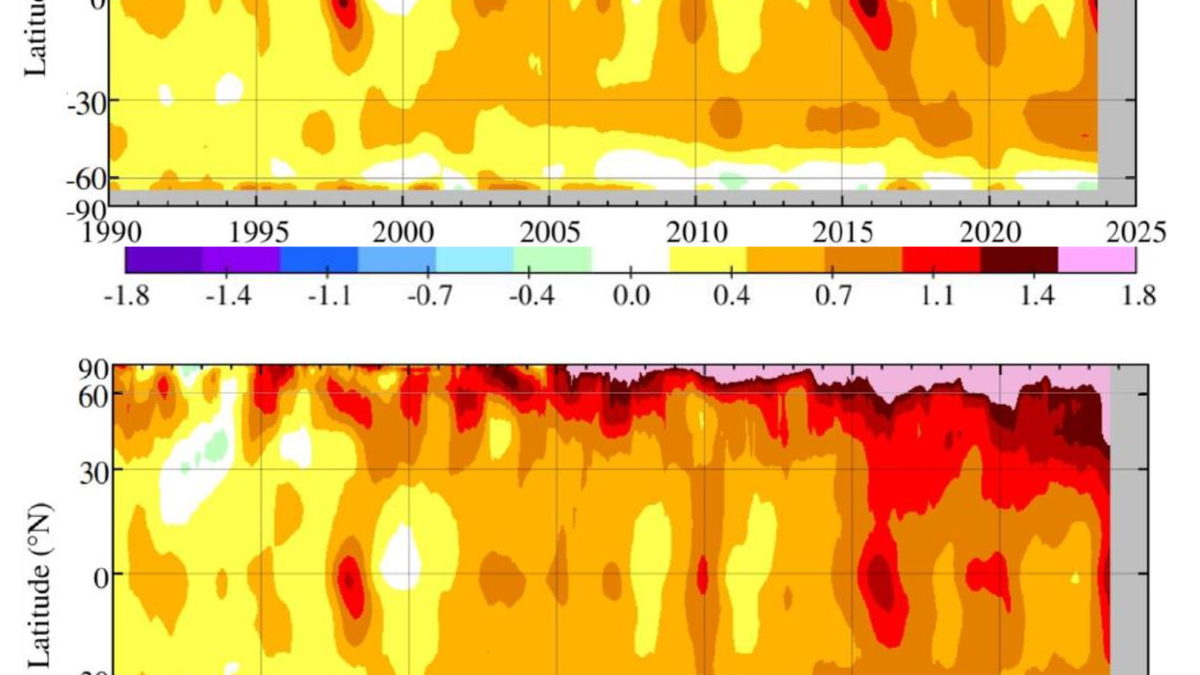G20 countries triple coal subsidies despite climate crisis – “It has now been 10 years since the G20 committed to phasing out fossil fuel subsidies, yet astonishingly some governments are actually increasing the amount they give to coal power plants”

By Damian Carrington
24 June 2019
(The Guardian) – G20 countries have almost tripled the subsidies they give to coal-fired power plants in recent years, despite the urgent need to cut the carbon emissions driving the climate crisis.
The bloc of major economies pledged a decade ago to phase out all fossil fuel subsidies.
The figures, published in a report by the Overseas Development Institute (ODI) and others [pdf], show that Japan is one of the biggest financial supporters of coal, despite the prime minister, Shinzo Abe, having said in September: “Climate change can be life-threatening to all generations … We must take more robust actions and reduce the use of fossil fuels.” The annual G20 meeting begins in Japan on Friday.
China and India give the biggest subsidies to coal, with Japan third, followed by South Africa, South Korea, Indonesia and the US. While the UK frequently runs its own electricity grid without any coal power at all, a parliamentary report in June criticised the billions of pounds used to help to build fossil fuel power plants overseas.
Global emissions must fall by half in the next decade to avoid significantly worsening drought, floods, extreme heatwave and poverty for hundreds of millions of people. But emissions are still increasing, with coal-fired power the biggest single contributor to the rise in 2018.

“It has now been 10 years since the G20 committed to phasing out fossil fuel subsidies, yet astonishingly some governments are actually increasing the amount they give to coal power plants,” said Ipek Gençsü, research fellow at ODI and lead author of the report.
“Momentum is growing around the world for governments to take urgent action to tackle the climate crisis and ending subsidies to coal would bring benefits to all [including reduced air pollution] and help set a level playing field for clean energy,” she said. […]
The researchers totalled the financial and tax subsidies given for mining coal and building and maintaining coal-fired power plants, including investments by state-owned companies. They found the average annual amount increased from $17bn in 2014 to $47bn in 2017. In contrast, the subsidies for coal mining halved, from $22bn to $10bn.
“In reality, government support to coal is much larger than our report’s numbers show, because many G20 countries still lack transparency on the many ways they subsidise coal,” said Ivetta Gerasimchuk, at the International Institute for Sustainable Development and another co-author. [more]
G20 countries triple coal power subsidies despite climate crisis

G20 coal subsidies: tracking government support to a fading industry
26 June 2019 (Overseas Development Institute) – G20 countries have a critical role to play in leading efforts to combat climate change, as they account for 79% of global greenhouse gas emissions. In 2009, they committed to phasing out fossil fuel subsidies in the medium term, and since then many have played an important part in driving forward climate action internationally.
However, a decade on from this commitment, G20 governments continue to provide billions of dollars of support for the production and consumption of fossil fuels, spending at least $63.9 billion per year on coal alone, the most polluting fossil fuel. They have also neglected to define or document the full extent of their subsidies.
This research tracks each G20 country’s progress in phasing out subsidies to the production and consumption of coal (including coal-fired power), looking at fiscal support, public finance, and state-owned enterprise investment. The report summarises key findings from 18 parallel country briefs, with accompanying data sheets that list all the support identified for each country.
Note: remaining country studies and methodology note forthcoming. For any interim methodology or data queries, please contact Ipek Gençsü.
Executive Summary
A decade on from their commitment to phase out subsidies to fossil fuels at the Group of 20 (G20) Summit in Pittsburgh, G20 governments continue to provide billions of dollars for the production and consumption of fossil fuels. This report finds that they provide at least US$63.9 billion per year in government support to the production and consumption of coal alone, with almost three-quarters of the support identified being directed to coal-fired power production.
At a time when tackling the climate crisis requires leadership and strong action from G20 countries, which account for 79% of global emissions, it is imperative that their governments transition away from all fossil fuels, including coal. Coal-fired power plants were the single largest contributor to the growth in global CO2 emissions in 2018, and continued G20 government support for coal is incompatible with achieving the aims of the Paris Agreement. Moreover, coal-fired power is one of the main causes of air and broader environmental pollution, resulting in hundreds of thousands of deaths per year.
Yet, our analysis finds that G20 governments continue to support coal through US$27.6 billion in domestic and international public finance, US$15.4 billion in fiscal support, and US$20.9 billion in state-owned enterprise (SOE) investments per year across the G20. This includes support through a wide range of instruments to prop up coal production, coal-fired power production, and other consumption of coal and coal-fired power, as well as support which is justified as a means of facilitating the transition away from coal. It must be noted that these figures are likely to significantly underestimate the actual amounts of support provided, as many measures are difficult to identify or quantify.
We also find that government support for the production of coal-fired power has increased in recent years, from just over US$17.2 billion per year (average for 2013–2014) to nearly US$47.3 billion per year (average for 2016–2017).
The sources of support and the activities they benefit vary across the G20:
- In terms of public finance, this year’s G20 host, Japan, remains one of the largest providers of public finance for coal overseas (US$5.2 billion per year), which threatens to undermine the credibility of Japanese Prime Minister Shinzo Abe’s call for other governments to step up their action on climate change.
- China is the world’s largest consumer of coal for power generation and industry, and pledged in 2014 to reduce coal consumption to 58% of total energy consumption or below by 2020. However, it continues to provide international public finance for coal mining and coal-fired power overseas (US$9.5 billion per year).
- India’s banking system is dominated by domestic public institutions that together provide around US$10.6 billion per year of public finance for coal mining and coal-fired power domestically. This has led to significant challenges for the country’s finance sector, undermined by coal assets at risk of bankruptcy driven in part by the transition to clean energy.
- Canada, China and Germany are among those countries whose governments have been providing support for rehabilitation of mining sites and for helping workers and communities. However, there is limited information as to the beneficiaries of this support and any attached conditions regarding phase-out commitments and deadlines.
- Our research has also identified numerous mechanisms provided by governments purportedly for energy transition, but that in fact continue to support coal-fired power. These include subsidies for capacity mechanisms (designed to guarantee security of power supply) in France, Germany, Italy, Russia, South Korea, Turkey and the United Kingdom, the allocation of free allowances to industry under the European Union Emissions Trading Scheme (EU ETS), research and development (R&D) support for coal-fired power generation with carbon capture and storage, and for co-firing of biomass with coal.
Several countries also provide substantial subsidies to the consumption of coal-fired power. However, there is very limited transparency, and these measures – and the resulting support – are not easily captured. While we were unable to quantify a number of these measures, we know that Indonesia, for example, provides over US$2.3 billion in fiscal support per year, with the stated reason being to compensate electricity generators for the increase in coal prices and for having to sell electricity to domestic consumers under regulated prices. Similar subsidies relating to provision of below-market prices for electricity consumers also exist, for example, in China, Indonesia, Mexico, Russia and South Africa, with much electricity for this consumption coming from coal-fired generation.
SOEs remain active in coal mining and coal-fired power, when they could be key to facilitating a rapid and ‘just transition’. Investments of SOEs in coal often continue unchecked, with Chinese and Indian SOEs investing nearly US$8.8 billion and over US$6.4 billion annually, respectively.
Despite these challenges, several G20 countries have taken important steps in moving away from coal production and consumption in recent years. These include Canada and the UK, who together created the Powering Past Coal Alliance (PPCA) to accelerate the global transition from coal to clean energy. PPCA members have committed to implementing a moratorium on new coal power plants, phasing out existing coal power generation, and restricting all types of coal finance. The PPCA now counts as members France, Italy and Mexico among G20 countries, alongside non-G20 states, plus subnational jurisdictions from the United States, Australia and South Korea. Our analysis finds that the governments of Canada, the UK and France have dramatically scaled back their support for coal over the last decade, both domestically and internationally. We also identify a fall in government support for coal production across the G20, from US$21.7 billion per year (average for 2013–2014) down to US$9.8 billion per year (average for 2016–2017).
To avoid dangerous climate change and make good on their commitments to end fossil fuel subsidies, the G20 must commit to rapidly ending their support for coal. They must also increase transparency by committing to conduct peer reviews of coal and other fossil fuel subsidies by 2020 and establish a regular process of tracking progress in ending subsidies and sharing the lessons learnt. Ending coal subsidies will bring environmental, social and economic benefits, including the setting of a level playing field for lower-cost clean energy. The G20 must build on existing efforts and ensure that subsidies to the energy transition do not lead to hand-outs to coal, and that any remaining support is directed to ensuring a rapid and ‘just transition’ for workers and communities.
As a first step in their wider coal transitions the G20 must:
- urgently agree to a complete phase-out of government support to coal mining and coal-fired power
- complete peer reviews of coal and other fossil fuel subsidies by 2020
- establish country-level plans for ending government support to coal, ensuring that:
- mechanisms with the stated aim of assisting the energy transition do not support coal
- production and consumption, and
- any remaining support facilitates a ‘just transition’ for workers and communities, and target the most vulnerable groups during the energy transition
- establish a standing agenda item in G20 Energy Ministerial meetings to share lessons learnt on phasing out government support to coal – and other fossil fuels – and to track progress towards phasing out coal, with support from the Organisation for Economic Co-operation and Development (OECD), the International Energy Agency (IEA), the International Monetary Fund (IMF) and other influential organisations.
The peer reviews should build on those already in progress or completed by Argentina, Canada, China, Germany, Indonesia, Italy, Mexico and the US, and would benefit from an expanded scope, including support through public finance and SOE investment.
G20 coal subsidies: tracking government support to a fading industry
